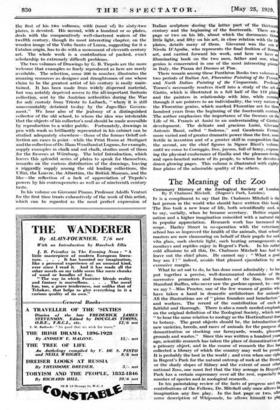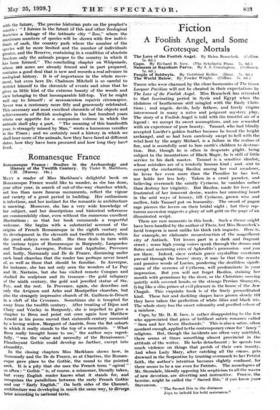The Meaning of the Zoo
IT is a compliment to say that Dr. Chalmers Mitchell is the last person in the world who should have written this book The Zoo took a new lease of life, both scientifically and, a to say, socially, when he became secretary. Better organi. nation and a higher imagination coincided with a natural rise in popular appreciation. Research work has increased its scope. Harley Street in co-operation with the veterina school has so improved the health of the animals, that school. masters are now clamouring on behalf of their pupils for such vita glass, such electric light, such heating arrangements at monkeys and reptiles enjoy in Regent's Park. In his rather cold allusions to all this, Dr. Chalmers Mitchell has had to leave out the chief plum. He cannot say : " What a good boy am I ! " indeed, avoids that pleased ejaculation by an excessive margin.
What he set out to do, he has done most admirably ; he has put -together a precise, well-documented chronicle of the successive promoters and founders of the - Zoo, from Sir Stamford Raffles, who never saw the gardens opened, to—nay we say ?—Miss Procter, one of the few women of genius who have taken a hand in domestic architecture for animals All the illustrations are of " pious founders and benefactors' and workers. The record of the contribution of each faithful and thorough. There is also a much needed emphasis on the original definition of the Zoological Society, which was " to bear the same relation to zoology as the Horticultural does to botany. The great objects should be, the introduction d new varieties, breeds, and races of animals for the purpose ot domestication or stocking our farmyards, woods, pleasure grounds and wastes." Since this was written a hundred yam ago, scientific research has taken the place of domestication al a primary object, and in the course of research the Zoo hal collected a library of which the country may well be proud. It is probably the best in the world ; and even when one sigh, in Regent's Park for the natural outcrop of rock at the Bronx, or the shady slopes of Sidney and the extent- of most othel national Zoos, one must feel that the tiny acreage in Regent's Park has a certain supremacy over all the rest, especially is number of species and in zoological research. In his painstaking review of the facts of progress and chi contributions of the Fellows, Dr. Mitchell only once allows hi imagination any free play. In the last page or two, afte some description of Whipsnade, he allows himself- to pig7 with the future; The precise historian puts on the prophet's mantle : I foresee in the future of this and'other Zoological societies a linkage of the intimate city " Zoo," where the maximum numbers of species will be shown with few indivi- duals of each, the country park where the number of the species will be more limited and the number of individuals greater, and the Reserve, containing irks condition of absolute freedom only the animals proper to the country in which it ilia been formed." The concluding chapter' on Whipsnade, whose 480 acres are already fenced and in part prepared, contains a good deal that is new and records a real advance in zoological history. It is of importance in the whole move- - ment, but even here Dr. Chalmers Mitchell is so careful to *strict himself to the chronicle of events" and aims that he gives us little hint of the extreme beauty of the woods and view belonging to that incomparable hill-top. Yet he might well say to • himself : si manunsentam requiris circumspice. Never was a centenary more fitly and generously celebrated. This necessary and most excellent chronicle of the objects and achievements of British zoologists in the last hundred years whets our appetite for a companion volume in which the animals shall play a part. " The meaning of this hundredth year, is strangely missed by Man," wrote a humorous versifier in the Times ; and we certainly need a history in which we shall hear more of the animals, how they have fared at different dates, how they have been procured and how long they have lived.









































 Previous page
Previous page